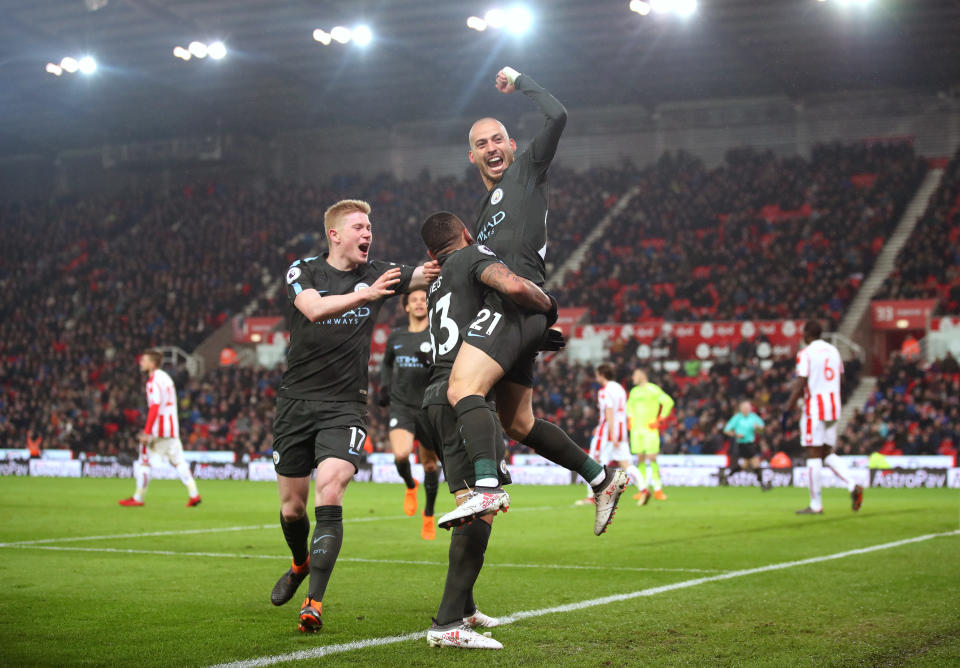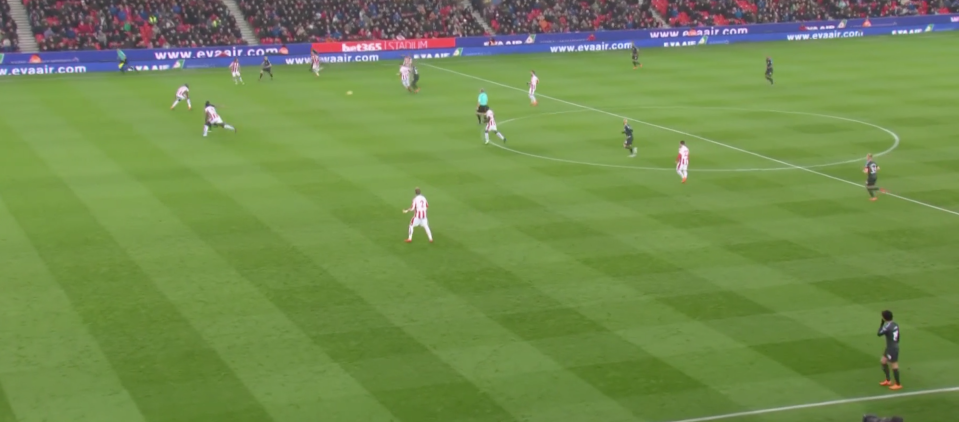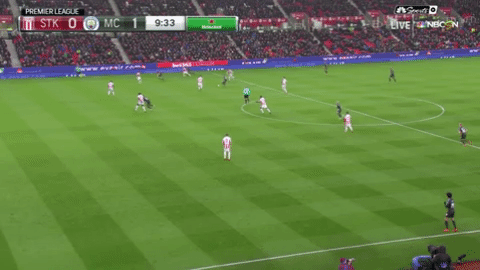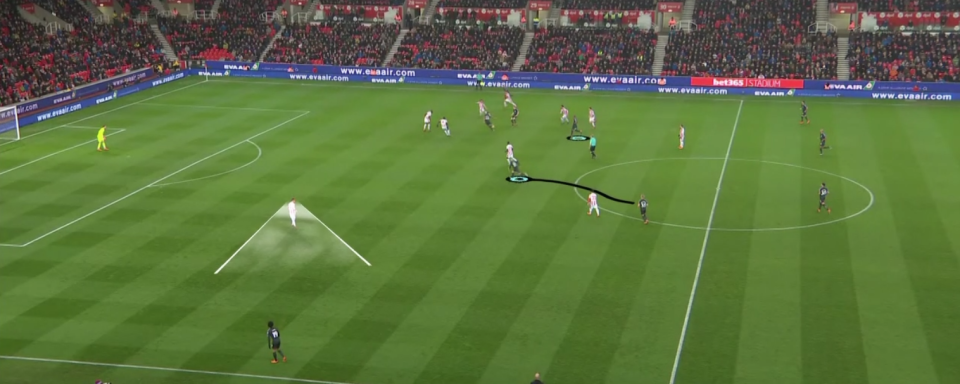2017-18 Premier League DARTS, Week 30: What makes Manchester City so good
Welcome to Premier League DARTS, FC Yahoo‘s weekly EPL column that will run every Monday or Tuesday morning. Why “DARTS”? Because Henry Bushnell will recap the weekend’s biggest games with Discussion, Analysis, Reactions, Takeaways and Superlatives. All of that is below. But first, a brief intro …
The Premier League weekend began with all eyes on Manchester. And it began with a reminder: that Jose Mourinho is still Jose Mourinho; that United is still United; and that second place is still theirs.
The weekend concluded, though, with another reminder. This one came courtesy of Manchester City. The traveling City fans made it explicit – in more ways than one.“Mourinho, are you listening?” they sung.
He probably wasn’t, but they went on anyway.
“To the song, that we’re singing?
We’re 16 in front,
You Portuguese c—,
Walking in a City wonderland”
City did away with Stoke, 2-0 at the Bet365 Stadium, and, as its fans joyously sang, went 16 points clear of United at the top of the table. The Citizens remain on track to clinch the title against their crosstown rivals on April 7. That will be the day they’re crowned.
Monday night, though, was a fitting and timely remind of why they’ll be crowned. The City fans explicated part of the “why” with another familiar tune:
“‘Cause we’ve got, Guardiola
we’ve got, Guardiola
we’ve got, Guardiola
Glad you’re mine.”
The best explanation, though, came from David Silva and his in-sync teammates.

1. Silva’s opener, and the read that enabled it
Martin Tyler said it on the broadcast: “Typical Manchester City.” And the Citizens, over 30 games, have defined that phrase as a gushing compliment.
It was Tyler’s response to the first goal, which was indeed emblematic of City’s brilliance. Superficially, it was quick, rhythmic and precise; it required teamwork and supreme technical ability. Deeper than that, there were examples of what makes City so good.
The goal came to fruition for two reasons. One was Silva’s remarkable recognition of and response to cues. Here he was, back in the center circle, when the ball was played into Gabriel Jesus’ feet:

Five seconds later, he was side-footing past Jack Butland from the center of the penalty area:
That’s because he was off and running toward the box before Stoke midfielder Badou Ndiaye had even processed the play. As the ball trickled into Jesus’ feet, Silva saw Stoke’s right-sided center back, Kurt Zouma, go with the Brazilian striker. He saw the space Zouma’s step opened up. He had to wait to ensure Jesus would maintain position. Once it was clear he would, Silva was off on his match-winning sprint:

That all sounds simple in writing. Even on replay, it looks like Silva simply exploiting napping defenders. But he processed a boatload of information in an extraordinarily short period of time. More on how he did so later.
2. Silva’s opener, and the space that enabled it
The reason Silva had so much space to run into? City stretches the field horizontally as well as any team in the world.
Some wingers have a tendency to get sucked toward the ball. They feel a need to proactively impact the game. Leroy Sane has been trained to avoid acting on that urge in certain situations. He successfully refrained on Monday, and NBC Sports’ studio crew illustrated the effect his restraint had:

With the ball on the right, Stoke fullback Moritz Bauer could tuck in. But he couldn’t completely ignore the flying German winger. He was left in a no-win situation, and couldn’t quite prevent Silva from giving City the lead.
3. Guardiola’s influence
The goal was vintage Guardiola. The spacing, the split-second decision making … everything about it.
Soccer, some people love to say, is an unscripted sport. Games, they say, are won and lost by individual players and their actions in an unstructured environment. And that’s bulls—.
To some extent, they’re right. But why not try to script as much of it as possible? Why not try to structure it advantageously in select situations and certain areas? That’s Guardiola’s philosophy, and it’s why he’s widely considered the best manager in the world. It’s why he’ll go down as one of the best ever.
Why did Silva react quicker than Ndiaye? Because he’s more experienced, accustomed to the pace of the Premier League … sure. But he was also accustomed to the patterns of that move – to specific stimuli that he knew should trigger a specific reaction. He knew that because he’s been conditioned by training reps. Because Pep is better at conditioning those movements than anybody in the sport.
And Silva’s read-and-reaction proved so fruitful because of the way in which the field was balanced. Because Sane was two feet from the left touchline rather than bombing into the box himself. More to the point, because he and Sterling have been taught to stay there.
Jesus, Sterling and Silva still had to makes plays, yes. In that sense, soccer is a player’s game. But don’t let anybody tell you a coach can’t have influence. And definitely don’t let a coach tell you he himself or she herself can’t have influence. That’s essentially an admission that he or she isn’t good enough at his or her job.
Guardiola, conversely thirsts for control over a match. He knows he can’t influence it directly. But he can prepare more meticulously than anybody else. He has figured out how to script things that others don’t even realize are scripted. Just as importantly, he’s able to drill those scripts into his players’ heads.
Guardiola’s fingerprints are all over City’s success. And Monday provided some of the clearest evidence yet.
Previous DARTS: Week 1 | 2 | 3 | 4 | 5 | 6 | 7 | 8 | 9 | 10 | 11 | 12 | 13 | 15 | 16 | 18 | 19 | 20 | 22 | 23 | 24 | 26 | 27 | 28 | 29
– – – – – – –
Henry Bushnell covers global soccer, and occasionally other ball games, for Yahoo Sports. Have a tip? Question? Comment? Email him at henrydbushnell@gmail.com or follow him on Twitter @HenryBushnell.


